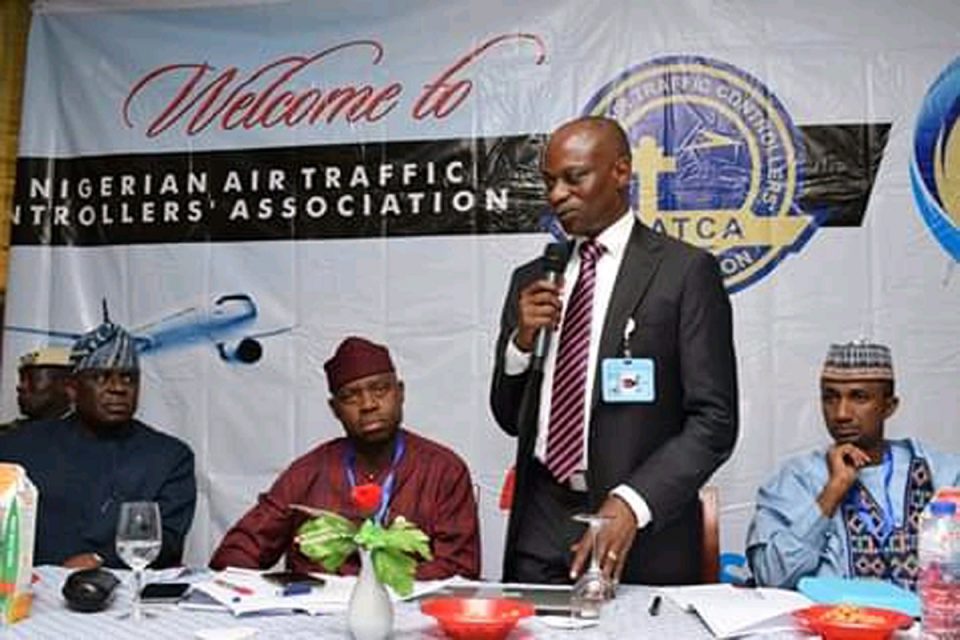Professionals in the Nigerian aviation industry have called on the Federal Government especially the management of the Nigerian Airspace Management Agency (NAMA) to improve on the existing communication equipment at airports and stations to prevent air accidents in the sector.
The National Air Traffic Controllers Association (NATCA), National Association of Aircraft Pilots and Engineers (NAAPE), Airline Operators of Nigeria (AON)n and other professionals in the sector said that poor communication between the cockpit and the air traffic controllers had caused avoidable havocs in the sector in the past.
They warned that if the government wanted an enhanced air safety, it was necessary for the government to invest heavily in safety equipment.
Mr. Abayomi Agoro, President, NATCA, whilepeaking at a conference organised by Accident Investigation Bureau (AIB) in conjunction the League of Airport and Aviation Correspondents (LAAC) over the weekend in Lagos with the theme: ‘Preventing Human Factors in Air Accident Investigations,’ said that poor communication and training on new facilities were needed to improve the situation in the air space.
Agoro observed that most of the indigenous carriers were not compliant with some of the new technologies introduced, while staff who are supposed to man the facilities are not adequately trained.
He emphasised that Air Traffic Controllers (ATCs) performed multi-task jobs in the course of discharging their duties, but noted that they require more training to remain relevant in their jobs in order to prevent air accidents and incidents from happening in the sector.
He said: “The issue of communication has been something we have been calling on the government and NAMA as a service provider to do more on it. The poor communication is not only from the ground equipment. At times, it is from the air stations, but most of the time, these are some things that can degenerate to incidents or accidents.
“Even, now that we have data exchange, which has to do with the Controller– Pilot Data Link Communications (CPDLC), not all the airlines are compliant with that and not all the controllers have gone through the training. So, definitely, it’s one of the areas we have to look critically into to prevent human factors we are talking about.”
Also, Engr. Abednego Galadima, the President, NAAPE, called for a robust relationship between employees and employers, especially among pilots and engineers.
He explained that some axis in the country were still totally not safe for flight services and called on the government to improve facilities at these airports.
Besides, Capt. Akin George, a representative of AON, described communication system in the sector as weak.
He lamented that this had been a recurring problem in the country in the past 10 to 15 years without tangible efforts at solving the challenge. 
“We take one step forward and within a month or two we are back to the norm. We have been talking about human factors today and we know one of the critical elements is communication, if you cannot communicate with your controller; then who is controlling who? As of today the communication between aircraft and the services coming out of Kano to Lagos is extremely weak.
“If you happen to be operating from the eastern side of the country, coming out of Calabar or Uyo, Port Harcourt and you’re heading towards Kano, it’s extremely weak. In most cases, you have to get another aircraft to rely on your information.
“Now whilst all this is going on, the aircraft does not stay in one place and so you have a dynamic situation, which for me, remains high risk and that is one of the areas we need to tackle as soon as possible in order to reduce the risk.”
Besides, Engr. Akin Olateru, Commissioner, AIB, in his opening remarks, stated that aircraft accidents were dominated by the failure of human factor failures.
He declared that it was necessary to understand the complexity of human factors within a system with the intent of reducing it to the barest minimal.
Olateru noted that globally, there had been some levels of improvement in the aviation industry since the beginning of the 21st century, but regretted that the number of air accidents especially in Nigeria remained unsatisfactory.
He added: “A system of models appear to be an important tool for overall understanding of the complexity of human factors, serving as starting-points to an analytical and classification research of the human factor.
“At the same time, these models enable qualified investigation and assessment of the causes of air accidents and incidents, thereby preventing them from a repeated occurrence.”




